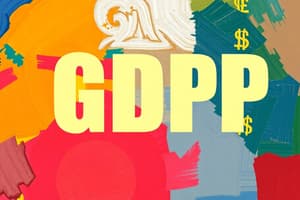Podcast
Questions and Answers
What is the difference between nominal GDP and real GDP?
What is the difference between nominal GDP and real GDP?
- Nominal GDP values goods at current market prices, while real GDP values goods at constant prices. (correct)
- Nominal GDP accounts for inflation, while real GDP ignores inflation.
- Nominal GDP considers the value of goods produced, while real GDP considers only the quantity of goods produced.
- Nominal GDP includes only the quantity of goods produced, while real GDP includes the value of goods produced adjusted for price changes.
In the Real-to-Nominal formula, what does the nominal value of an economic variable depend on?
In the Real-to-Nominal formula, what does the nominal value of an economic variable depend on?
- The market demand for the variable.
- The quantity of the variable produced.
- The inflation rate in the economy.
- The price level and the real value of the variable. (correct)
If the price of apples increases from $0.50 to $0.55 per pound and the quantity produced of apples increases, what will happen to the real output of apples?
If the price of apples increases from $0.50 to $0.55 per pound and the quantity produced of apples increases, what will happen to the real output of apples?
- Real output can't be determined from the information provided.
- Real output will decrease.
- Real output will increase. (correct)
- Real output will remain unchanged.
In Year 2, if the price of xylophones increases from $10 to $12 and the quantity produced also increases, what impact will this have on the nominal GDP compared to the previous year?
In Year 2, if the price of xylophones increases from $10 to $12 and the quantity produced also increases, what impact will this have on the nominal GDP compared to the previous year?
How is nominal output different from real output?
How is nominal output different from real output?
What economic concept is used to calculate the growth rate of a variable over time?
What economic concept is used to calculate the growth rate of a variable over time?
Which economic statistic is measured using actual market prices and is not adjusted for inflation?
Which economic statistic is measured using actual market prices and is not adjusted for inflation?
What is the process called by which capital ages and loses value?
What is the process called by which capital ages and loses value?
Which of the following represents all income to businesses and individuals?
Which of the following represents all income to businesses and individuals?
If an economic statistic is measured after being adjusted for inflation, it is known as?
If an economic statistic is measured after being adjusted for inflation, it is known as?
Which value is calculated by taking Gross National Product (GNP) and subtracting the value of depreciation?
Which value is calculated by taking Gross National Product (GNP) and subtracting the value of depreciation?
If unwary analysts compared nominal GDP in different years without considering inflation, what might happen according to the text?
If unwary analysts compared nominal GDP in different years without considering inflation, what might happen according to the text?
What is needed to measure changes in output by extracting the increase in prices from nominal GDP?
What is needed to measure changes in output by extracting the increase in prices from nominal GDP?
When converting nominal figures to real figures, what should be done to the published price index?
When converting nominal figures to real figures, what should be done to the published price index?
How is the nominal value of output calculated?
How is the nominal value of output calculated?
What is a two-digit decimal number used as a price index?
What is a two-digit decimal number used as a price index?
In a business cycle, what is the lowest point of output before a recovery begins known as?
In a business cycle, what is the lowest point of output before a recovery begins known as?
Which term refers to the relatively short-term movement of the economy from recession to expansion?
Which term refers to the relatively short-term movement of the economy from recession to expansion?
Flashcards are hidden until you start studying




